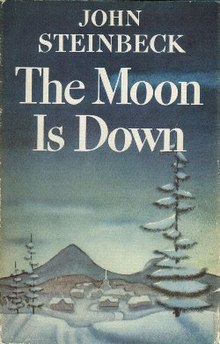The Moon is Down

First edition
|
|
| Author | John Steinbeck |
|---|---|
| Country | United States |
| Language | English |
| Genre | realistic fiction |
| Publisher | Viking Press |
|
Publication date
|
1942 |
| Media type | Print (Hardback & Paperback) |
| Pages | 188 pp |
| LC Class | PS3537.T3234 |
The Moon Is Down, a novel by John Steinbeck fashioned for adaption for the theatre and for which Steinbeck received the Norwegian King Haakon VII Freedom Cross, was published by Viking Press in March 1942. The story tells of the military occupation of a small town in Northern Europe by the army of an unnamed nation at war with England and Russia (much like the occupation of Norway by the Germans during World War II). A French language translation of the book was published illegally in Nazi-occupied France by Les Éditions de Minuit, a French Resistance publishing house. Furthermore, numerous other editions were also secretly published across all of occupied Europe, including Norwegian, Swedish, Danish, Dutch and Italian versions; it was the best known work of U.S. literature in the Soviet Union during the war. Although the text never names the occupying force as German, references to "The Leader", "Memories of defeats in Belgium and France 20 years ago" clearly suggest it. Written with a purpose to motivate and enthuse the resistance movements in occupied countries, the book has appeared in at least 92 editions across the world.
Taken by surprise, a small coastal town is overrun by an invading army with little resistance. The town is important because it is a port that serves a large coal mine. Colonel Lanser, the head of the invading battalion, along with his staff establishes his HQ in the house of the democratically elected and popular Mayor Orden.
As the reality of occupation sinks in and the weather turns bleak, with the snows beginning earlier than usual, the "simple, peaceful people" of the town are angry and confused. Colonel Lanser, a veteran of many wars, tries to operate under a veil of civility and law, but in his heart he knows that "there are no peaceful people" amongst those whose freedom has been taken away by force. The veil is soon torn apart when Alexander Morden, an erstwhile alderman and "a free man," is ordered to work in the mine. He strikes out at Captain Loft with a pickaxe, but Captain Bentick steps into its path and dies of it. After a summary trial, Morden is executed by a firing squad. This incident catalyzes the people of the town and they settle into "a slow, silent, waiting revenge." Sections of the railroad linking the port with the mine get damaged regularly, the machinery breaks down often, and the dynamo of the electricity generators gets short circuited. Whenever a soldier relaxes his guard, drinks or goes out with a woman, he is killed. Mayor Orden stands by his people, and tries to explain to Col. Lanser that his goal – "to break man’s spirit permanently" – is impossible.
...
Wikipedia
